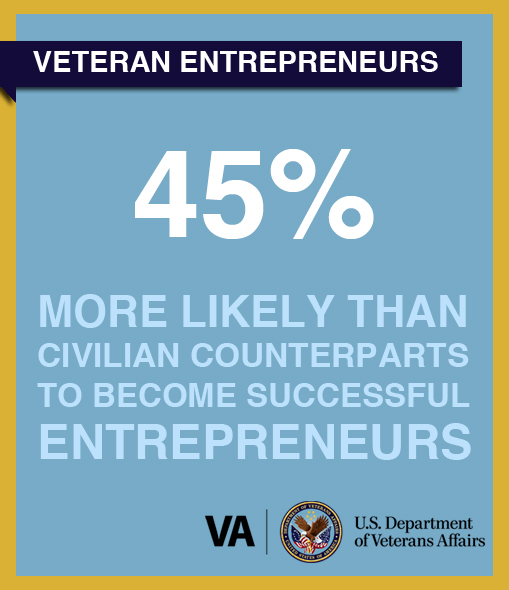Starting an online business is tricky. This goes double when your company doesn’t directly sell anything. Almost everyone’s got a cool idea for something. To bring your idea to fruition, you’ve got to devote time and money – a difficult decision when you aren’t totally sure if it will be profitable. It’s a big risk, just like starting any other business.
When I began brainstorming, I knew my first priority was going to be building something for military and Veterans – the community I know and love. I created a product that allows people to see which local companies will give a military or Veteran discount. It’s an idea which has been created by a handful of other companies and individuals. According to successful entrepreneurs, this is actually a good thing. The goal is to take an existing product or service, and do it better.
The greatest initial challenge was the technical aspect. People have some misconceptions about what it means to “make a website.” Due to the abundance of websites available, many folks imagine the process as some tricky version of PowerPoint: dragging, dropping, clicking until the thing just does what you want. This can be true with modern website templates, but not for custom ones. I had to configure servers, optimize databases, and write code until I was blue in the face.
Sometimes new entrepreneurs mistakenly believe they’ve done the “hard part” of creating an online business by bringing the idea. Sometimes they even ask programmers to work for free in exchange for a portion of ownership. Although they might find someone willing to do this, it’s extremely uncommon. Programmers can be expensive, so the programmer would have to be fairly certain there’s going to be a big return on his or her investment. You’re much more likely to find a programmer by offering cash as payment.
As you begin creating your online business, you’ll either need to fork out a bunch of money for a programmer or pick up a “development kit” and begin programming with fire in your eyes. If you choose the latter, you’ll spend several months trying, failing, and banging your head against a wall.
A higher percentage of people try and quit programming than USMC boot camp. Within 1-2 years, you’ll be proficient enough to build almost anything you can think of, but at that point, you’ll be the one with a big decision to make: go fetch a higher, predictable salary or spend your time building a risky idea. The technical aspect of creating an online business will eat the lesser-determined for breakfast.
My second-largest challenge was figuring out exactly what people wanted. Initially, I thought I knew. I examined other military discounts collectors, found things I could do better, and set out with a solid design philosophy in mind.
When I was done, I thought my company would explode like Facebook among the military community. I was hilariously wrong. It attracted almost no interest, and for the life of me – I couldn’t figure out why. The exact lessons I learned couldn’t be covered in the scope of this article, but it required an unexpected degree of trial-and-error.
Over the following year, I performed several additional iterations of re-design until I finally began attracting the attention I wanted: buyout offers, daily visitors, partnership opportunities, and the attention of bigger companies.
On this note, I’m going to squash a common misconception: the belief people will love your business and tell their friends about it. Although anything is possible, you must spend time to truly consider whether your product is “cool” enough that people will tell others about it.
If you’re going to sell multipurpose staplers, you better make sure you show up near the top of Google for a search like “buy multipurpose stapler”. This will require you to learn the principles of search engine optimization because people probably aren’t going to tell their friends about your multipurpose stapler, even if there’s a high market for them.
For many people, the third challenge is the easier of the bunch: creativity. I had to become creative, and I’m not naturally creative at all. It was difficult for me to understand the psychology behind what makes people react to different sizes, colors, and layouts. After devoting time to learning the psychology of design, I re-did the website’s skin. This time feedback was much better.
Today, I’m proud to own an online business. I attribute its success to several sources I’m proud to share.
The Marine Corps taught me an exceptional level of discipline by not accepting mediocrity or defeat under any conditions. The Department of Veterans Affairs provided me with the opportunity to attend college, where I learned the basics of programming.
With my business, I failed more times than I can count and I say that proudly! Every time I failed, I learned one more vital lesson to achieving success. If you’re feeling discouraged at lack of progress, you’re heading in the right direction. There are barriers any new entrepreneur will encounter, and those who persist will inevitably succeed. As Veterans, we’ve ascertained a distinct advantage in our determination and positive spirit. You can utilize your military experience to build something awesome.
Rick’s top Veteran entrepreneur resources
- Post-9/11 GI Bill
I used the GI Bill to get traction in my programming skills while continued learning on my own and studying entrepreneurship through other resources. This was the only official resource I ever took money from that boosted my business. - Craigconnects.org, by Craig Newmark
The founder of Craigslist is a huge Veteran supporter. I received great advice from this network. - Entrepreneur.com Veteran section
There are articles on everything from starting storefront franchises, to getting financing, to which skills Veterans have translate best to entrepreneurship and how to capitalize on them. I used Entrepreneur.com for advice, experience and learning. - VA.gov in partnership with BusinessUSA
BusinessUSA is similar to Entrepreneur because they have a plethora of information readily available if you’re willing to take the time to read and understand it. - SBA.gov (Small Business Administration)
This website contained all the legal information I needed to know. Not only do they have layman’s explanations for specific scenarios, they provide valuable advice specific to Veterans.
Rick’s business can be found at www.gruntroll.com

Topics in this story
More Stories
The Social Security Administration is hoping to make applying for Supplemental Security Income (SSI) a whole lot easier, announcing it will start offering online, streamlined applications for some applicants.
Yusuf Henriques, an Army Veteran and former combat medic, is the founder and CEO of IndyGeneUS AI, a genomics company on a mission to improve health equity by increasing representation of women and racial minorities in clinical trials.
Online shopping scams are the riskiest scam for Veterans, with 77.3% of reports confirmed losing money when targeted by this scam.








Thanks Rick.
I too want to start an online business. USMC veteran here. Good advice here.
I tried the “development kit” and within days I dropped it. Every step required more $$$.
I am going to use this article as a guide to get to where I want to go.
Steve
Hi Steve,
Beginning with a development kit shouldn’t require money, since companies have lots of incentive to provide developers with quality building tools. Maybe you’re referring to Apple’s IDE (XCode), in which case you do have to pay a membership fee in order to get your apps published but the development itself is possible without the membership. Building with certain IDE’s in Windows can also become expensive, but those are enterprise-level tools you shouldn’t be using as a beginner anyway.
Feel free to e-mail me at “contact at gruntroll dot com”. I’ll respond with my personal e-mail. Learning to develop does require a lot of self-starting and research, so I couldn’t exactly teach you to program–but I could point you in the right direction so you can begin learning on your own.
Hello Brother,
This year I started up VHV Veterans Helping Veterans USA or VHV-USA for short. Currently, we’re in the process of searching for funding and grant writers. We have a phone conference coming up with a major homeless veterans programs in Boston. My primary back ground is in business, sales, teaching, carpentry construction, as well as an honorable USMC disabled service connect veteran. Maybe, you have some helpful advice for us in our search for funding at this point? Thank you!
Semper Fi,
Mikel Posey
317.207.2057
ETIAM IN PUGNA “STILL IN THE FIGHT”
Rick- so proud of you. You have wanted this and I know how much passion you have with helping others in circumstances that u believe in. This is just the start for you my man.. You have BIG things coming !
Great job Rick!
Great advice, Rick-thanks for sharing. I didn’t know that building a web site could be so involved!
Hi Jamal,
Creating a website doesn’t have to be hard, as I touched on just a bit in the article. I’ll clarify.
If you use a popular Content Management System (CMS) like WordPress, it can actually be incredibly easy for beginners. Where the challenge will arise is when you want your website to do something someone else hasn’t already created.
As an example, let’s say you’ve got your WordPress website all setup and managing your list of military discounts exactly as you want it. But now, you want to do something custom; let’s say you want to tie in your list of business locations with Yelp and Google so people can see reviews without having to leave your page. But, you don’t want the results to pull on every page load since it will slow down loading times too much–you want them to be displayed dynamically when the mouse is hovering over a certain item. Maybe there’s a plugin that will work seamlessly with what you’ve setup–or, maybe there isn’t. If there isn’t, it has to be programmed.
CMS are powerful tools which can fill a majority of webmasters basic needs, but aren’t the solution for every problem. It’s important to understand that the popularity of CMS has spread a misconception about the ease of “making a website”.
In short, if you’re “making a website” to run a blog or e-commerce site, use a CMS. If you’re creating an application which runs on a web server, learn to program. It’s important to create an educated strategy before setting out to build your project.
Thanks for your comment!